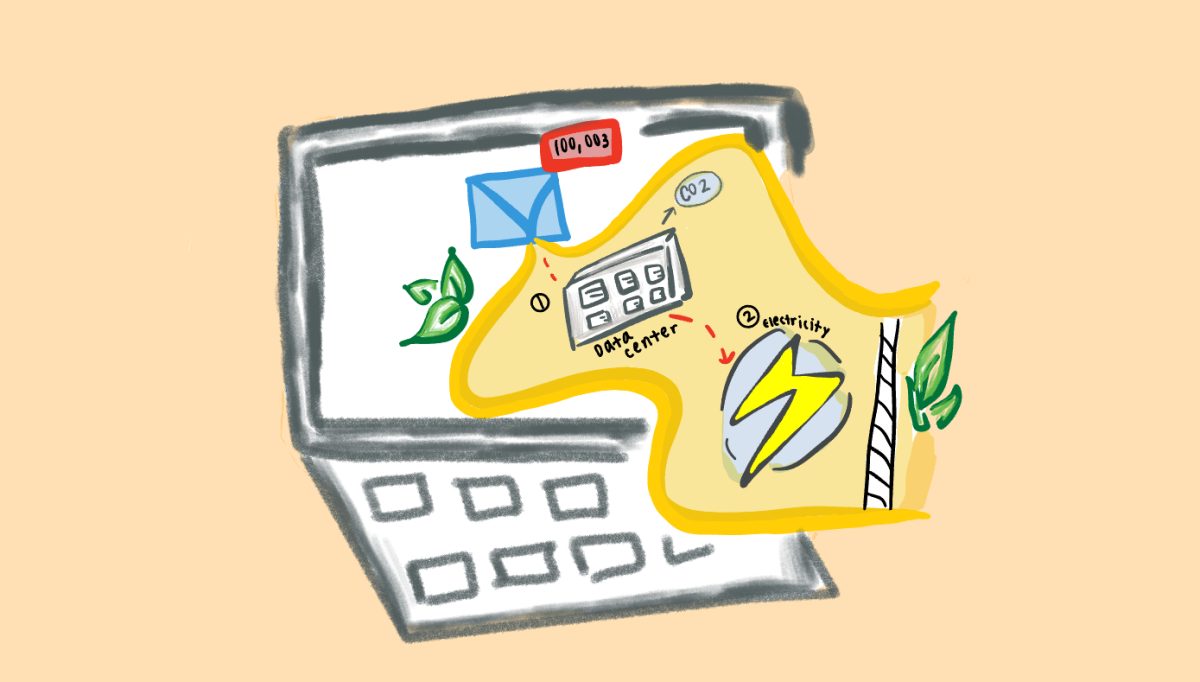A blue envelope icon and a large, looming number shows the sea of unchecked and undeleted emails that have piled up in your inbox over the past couple days, months or even years. These familiar experiences with email-heavy inboxes not only indicate the amount of subscription emails you signed up for but also carbon emissions. In fact, this stack contributes to carbon footprints that email users can actively mitigate by deleting unnecessary emails.
72% of people are unaware of the correlation between email inboxes and carbon footprints. This highlights the importance of reducing email storage as it can contribute to an increase in large-scale digital sustainability, and individuals should proactively delete unneeded emails to mitigate footprints.
Email storage is run by data centers which require electricity and great quantities of fossil fuels, according to Fight Climate Change. Thousands of data centers collectively contribute 2% of the world’s carbon emissions, according to Greenly. Broadly, environmental obstacles from this digital storage demands action like deleting any unneeded emails.
Due to technological advancements that demand energy, the number of data centers has significantly increased in recent years, according to The New York Times. By running on electricity, expanding data centers take up more storage capacity, according to AP Environmental Science teacher Courtney Moder. In turn, this may encourage increased email storage, which means that more fossil fuels may go towards maintaining digital messages.
Environmental researcher Mike Berners-Lee noted that additional variables impacting emails’ footprint include attachments that can increase the digital message’s carbon emissions by over tenfold and phone sizes, according to BBC. The digital carbon footprint from emails transcends storage, extending to the process of sending them, according to a study on emails’ carbon footprints. The researchers found that since the emails constantly require electricity, the exchange emits a yearly 22 million metric tons of carbon dioxide, which emphasizes the importance of deleting email.
“At the end of the day everything that’s being built, whatever kind of infrastructure it is, you’re still going to have some sort of tap into that electric grid,” Moder said. “That’s what’s founded on fossil fuel energy until we can make that complete switch off the grid.”
Some may argue that reducing emails in inboxes does not mitigate carbon emissions as storage systems run on relatively stagnant amounts of energy, regardless of whether they are on or off, according to Forbes. However, actions add up: if 3.9 billion users each delete 10 emails, carbon emissions are reduced by the same amount that would be released through 19,356 tonnes of coal, according to The Good Planet.
23 percent of Americans reported they believe personal sacrifices are needed to abate climate change, according to a 2023 Pew Research Center survey. Deleting unnecessary digital mail may not be a monumental sacrifice, but this quick action can become a collective initiative that then reduces anxieties surrounding digital carbon footprints.
Proactively deleting any unnecessary emails can mitigate individual carbon emissions, and taking this simple step can go a long way.




